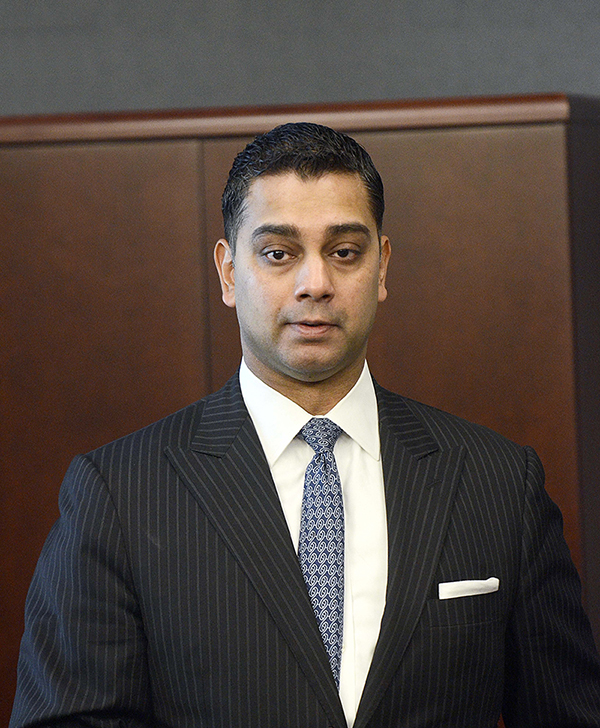Aggie investment banker advises students to learn every day
November 15, 2013
|
Mays Business School
A job as director and head of agricultural commodities research for Societe Generale touches millions of lives, but the deepest rewards Christopher Narayanan ’96 receives are the one-on-one interactions with clients based on his in-depth analysis. “There is nothing better than working to get on the level with a client where you can challenge each other and develop a better product for both of us.”
Narayanan recently described his job to a group of business honors students at Mays. He sets the house view of where his employer expects prices to go on commodities such as soybeans, corn, wheat, sugar and livestock. He creates a quarterly report that reviews each commodity, and he projects prices four quarters and five years out. To do that requires daily monitoring of news and updates from the marketplace. He says he spends up to 65 percent of his day reading and updating data, then he spends the remainder of his time talking to clients and salespeople and preparing reports. “It’s a lot of moving parts, but once you get into your systems, you just keep it going.”
Narayan received two agriculture degrees from Texas A&M University. He served in the U.S. Marine Corps before earning an MBA from the University of Texas. He worked in positions at agribusinesses, commodity brokerages, hedge funds and investment banks. And though his current job is in New York City, he says the company’s French roots are apparent. “The people in this company take coffee breaks and go to lunch together. That is reflective of the culture here.”
Narayanan cautioned the students not to get caught up in solely what models produce, because the markets and other factors change so quickly. “As you go through your classes, learn the methodology and terminology, but always remember these are guides, they aren’t absolutes,” he cautioned. “When you do get out of school, obviously you do what your boss tells you, but as you move up you have more flexibility and you draw from your experiences and do what your data and your gut tell you to do. When you graduate, your learning has just begun. Take every opportunity to advance your knowledge and skills.”
Cristina Ayala ’14, a business honors and supply chain major, said she learned a lot from Narayanan about the basics of agricultural commodities, such as who the major producers are, how the production may fluctuate and how they are traded. “He emphasized that in order to predict the price of an agricultural commodity more precisely, attention to cash markets is a must,” she explained. “Also, he emphasized how important it is to stay on top of current events, both nationally and globally – especially if you are in investment banking.”
Jordan DePuma ’14, a business honors and supply chain major, said the students benefited from Narayanan’s description of the 15 different commodities he covers, and the details of the daily activities of his job. “He also stressed the importance of keeping up with current events and being fluent in programs like Microsoft Excel.”
Narayanan told the students to prove their desire to succeed by making good grades and getting involved in activities that allow them to display their leadership skills. “Anyone who tells you grades don’t matter isn’t being honest. You are competing against the very best this country has to offer.” He also advised them to work for three to five years before pursuing an MBA, to develop their skills to analyze information quantitatively and to be geographically mobile. “If you have a chance to do an internship or job somewhere else, do it,” he said. “Don’t be afraid to leave Texas. It’s not going anywhere.”
About Mays Business School
Texas A&M University’s Mays Business School educates more than 5,000 undergraduate, master’s and doctoral students in accounting, finance, management, management information systems, marketing and supply chain management. Mays consistently ranks among the top public business schools in the country for its undergraduate and MBA programs, and for faculty research. The mission of Mays Business School is creating knowledge and developing ethical leaders for a global society.



